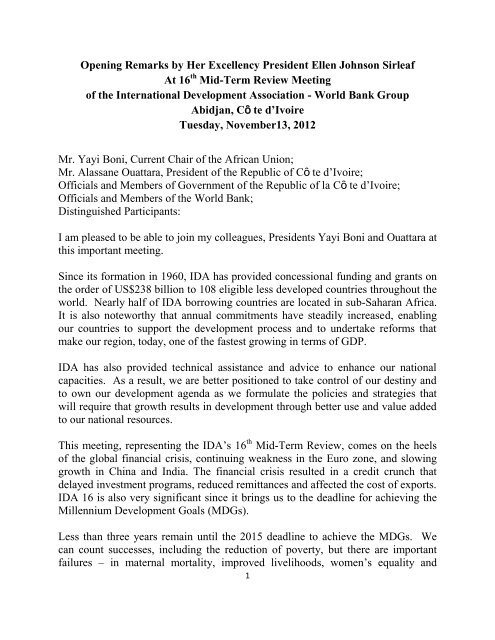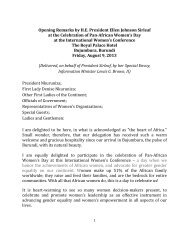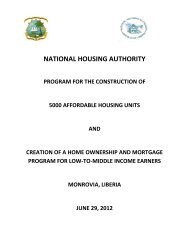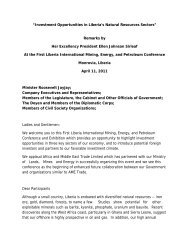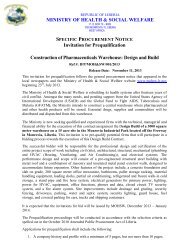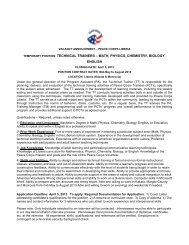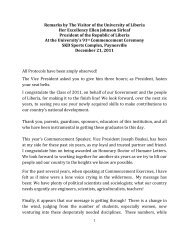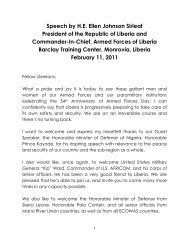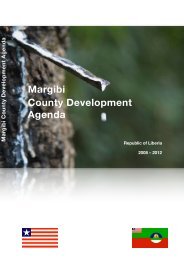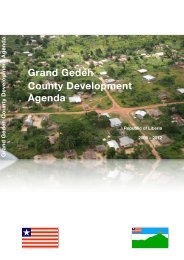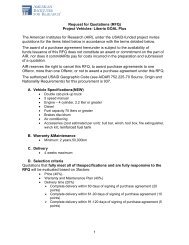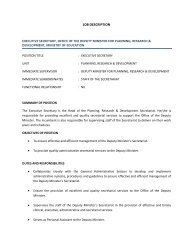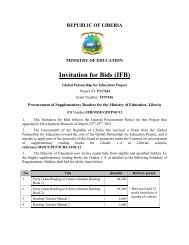Opening Remarks by Her Excellency President Ellen Johnson ...
Opening Remarks by Her Excellency President Ellen Johnson ...
Opening Remarks by Her Excellency President Ellen Johnson ...
Create successful ePaper yourself
Turn your PDF publications into a flip-book with our unique Google optimized e-Paper software.
<strong>Opening</strong> <strong>Remarks</strong> <strong>by</strong> <strong>Her</strong> <strong>Excellency</strong> <strong>President</strong> <strong>Ellen</strong> <strong>Johnson</strong> SirleafAt 16 th Mid-Term Review Meetingof the International Development Association - World Bank GroupAbidjan, Cȏ te d’IvoireTuesday, November13, 2012Mr. Yayi Boni, Current Chair of the African Union;Mr. Alassane Ouattara, <strong>President</strong> of the Republic of Cȏ te d’Ivoire;Officials and Members of Government of the Republic of la Cȏ te d’Ivoire;Officials and Members of the World Bank;Distinguished Participants:I am pleased to be able to join my colleagues, <strong>President</strong>s Yayi Boni and Ouattara atthis important meeting.Since its formation in 1960, IDA has provided concessional funding and grants onthe order of US$238 billion to 108 eligible less developed countries throughout theworld. Nearly half of IDA borrowing countries are located in sub-Saharan Africa.It is also noteworthy that annual commitments have steadily increased, enablingour countries to support the development process and to undertake reforms thatmake our region, today, one of the fastest growing in terms of GDP.IDA has also provided technical assistance and advice to enhance our nationalcapacities. As a result, we are better positioned to take control of our destiny andto own our development agenda as we formulate the policies and strategies thatwill require that growth results in development through better use and value addedto our national resources.This meeting, representing the IDA’s 16 th Mid-Term Review, comes on the heelsof the global financial crisis, continuing weakness in the Euro zone, and slowinggrowth in China and India. The financial crisis resulted in a credit crunch thatdelayed investment programs, reduced remittances and affected the cost of exports.IDA 16 is also very significant since it brings us to the deadline for achieving theMillennium Development Goals (MDGs).Less than three years remain until the 2015 deadline to achieve the MDGs. Wecan count successes, including the reduction of poverty, but there are importantfailures – in maternal mortality, improved livelihoods, women’s equality and1
environmental sustainability. Moreover, although significant progress has beenmade in many countries, and several are likely to achieve most of the Goals, ourcountries in sub-Saharan Africa rank far behind the other regions. This is why thisReview is of utmost importance, and I am glad that Abidjan has been chosen as thevenue. It is here, in our sub-region, that we face the greatest challenges that havebeen covered <strong>by</strong> your Progress Report.Although West and Central Africa possess a high percentage of the world’sbiodiversity, we are seriously challenged to find effective responses to rising sealevels and changing agriculture production cycles. Although I represent the highestpotential of women’s empowerment, the majority of our women in the informalsector, while feeding the nation through farming and marketing, remain largelyilliterate, caught in the poverty trap.Youth across the continent and young graduates face the stark realization of beingunable to find jobs, exposing their vulnerabilities to crime and violence. Perhapsthe more relevant aspects of your Review to our unfulfilled expectations are theresponse to crisis and promotion of regional integration. Peace and stability, a sinequa non for sustained growth and development, still elude too many of ourcountries. Our hopes to achieve the potential for regional integration have beenlong delayed due to long-standing trading relationships and lack of effectiveinternational support.We applaud the recent progress supported <strong>by</strong> multilateral programs that have led tothe West Africa Gas Pipeline and the West Africa Power Pool. But in Liberia, forexample, although we have significant commitments that will help reconstructroads and build new bridges and bring electricity to some of our communities, ithas taken almost four years from commitment to commencement, and I still can’ttravel on a decent road from Monrovia to Abidjan or to Freetown or Conakry.But individual countries must do our part. By formulating regional promotioninterventions and pooling our resources, we can share the high cost ofinfrastructure that overcomes some of the hurdles to regional integration. We canpromote public/private partnership to lower the burden on public resources.I am pleased that I have been appointed <strong>by</strong> the UN Secretary-General as one of thethree co-Chairs of the High-Level Panel on the Post-MDG Framework. The themesof IDA16 are in consonance with the emerging framework of what the post-MDGdevelopment agenda should include. We continue to emphasize, however, that2
there are still three years left before the deadline, and all stakeholders –governments, multilateral institutions and private sector partners – must accelerateour efforts to accomplish that which can be achieved in the remaining years. In ourconsultations toward the development of a successor framework, one cannotoveremphasize the role of reassessing how IDA credits in the next three years canbe deployed to enhance and advance countries’ development agendas.The themes of this Review highlight sustainable development, equitable growth,crisis response and regional integration. We know that the changing climate willhave varying effects on different regions. As we plan and implement ourdevelopment agendas, we must now intentionally account for climate change.Growth must be equitable. Women’s participation in our economic, social andpolitical life must become an integral part of our development agenda. Unless weact intentionally to reduce inequity within and between our societies, we will notbe able to eradicate poverty. We must therefore work to increase the pace at whichgender-related MDGs form the integral core of our development agenda.This will provide the basis for the formulations of a successor regime that ispeople-centered, with a focus on poverty to finish the job started <strong>by</strong> the MDGs – asuccessor regime that calls for inclusive growth and development as drivers ofsustainable poverty reduction and one in which global partnerships are based onmutual responsibility in a supportive global enabling environment. The successorregime must also involve a new deal for fragile States trying to cope in an effort tomaintain stability for transformation.Distinguished Participants:The record is clear. Over the past few years, IDA Replenishment Reviews have seta clear trend, a trend in increasing commitments. IDA16 replenishment set arecord commitment, on the order of US$40 billion – a clear indication of theworld’s commitment to, and appreciation of, the programs supported <strong>by</strong> IDAcredits. In the last decade, IDA funding financed the training of 3 million teachers;provided over $700 million in loans to small and medium enterprises; built andrestored almost 120,000 km of roads; immunized 300 million children; andimproved access to water for over 100 million people.This Review, while aiming at finding new approaches to meet new challenges,must also give recognition to the significant progress in development throughoutthe poor countries of this world. Thirty-six of IDA’s borrowing countries have3
graduated from eligibility for concessional lending, and we are confident that thetrend will continue. This is a record of success.Today, in this increasingly interdependent world in which we are all in eachother’s supply chain, the continuing success of IDA expands the global economicpie and increases the purchasing power for expanded global trade.I thank you!4


